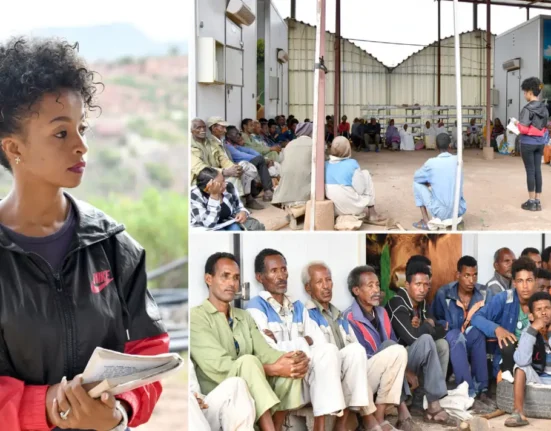Soon after the rainy season, which we have had abundantly this year, there comes the harvesting season. And just before farmers get their hands full with all of the tough but happy field work to fill-up reaped crop enough to cover the family’s table for the whole year and much for stores in town to be sold, this time of the year is moreover traditionally scheduled for weddings; a rather relaxed time of merriments, joy, and the ‘can’t do without’ typical and lovely festivities that don’t deny dancing.
Therefore, now is the time of festivities and Asmara’s parks are busy hosting couples’ wedding photos. My cousin Mike got married to his lovely girl Honey a couple of weeks ago, and I have had the blessing to directly be part of a blend of beautiful tradition that I am honored to share with you.
The rainbow of cultural practices seen throughout a wedding is numerous, especially when in Eritrea we have nine ethnic groups each with a myriad of flamboyant customs. So much so, a whole book would not be enough. What I will be zooming in on though, are the after-marriage activities, of which I was part of in my cousin’s wedding, coated up by some research I did prompted by its radiance. Henceforth, some facts about local honeymoons.
The meaning of marriage in Eritrea goes way far from just the bringing of two people in the holy sense of matrimony. It actually penetrates all the way to its holistic version of merging two families, two communities, two hometowns, and two holy kinship lines. Which is exactly why, when a couple decides to get married, the first ones to know after the couple itself are the parents. The parents will then tell the elders and later the elders, of both sides, would start their mission towards the making of this blessed merger.
Aren’t we just well-raised children?! … We let parents meddle with ‘our’ stuff even at the age of thirty!!!
Looking up for some common ascent in the lineages, for example, is one of their technical missions, in doing so the families give thanks to that ascent for allowing ‘the joint’. Elders believe, we Eritreans are of ‘a’ family: they do not discriminate at all. In fact, truth be told, the further the lineage the better, because not only are they happy to merge two families but also – and here comes a common saying we hear a lot: “megeshi yikonena,” meaning an excuse for a holiday trip to visit a geographically distant but emotionally close family. (Wow! how awesome are they?!).
And at the end, the wedding happens with the blessing of the community, and things get even a lot more exciting afterwards. Conventionally, even if a couple is to live on its own, it does not happen immediately after. The couple heads straight to the groom’s house for honeymoon; in Tigrigna it’s called ‘hitsnot’. The groom’s family has the duty of decorating the newlyweds’ room, and for as long as a month or more, the bride and the groom are treated like royalty. In fact, even their title is promoted to His and Her Royalty, ‘Goytay’ and ‘Imbeytey’ in Tigrigna. I am not ridiculing; one cannot just have the audacity to call them less! It’s traditionally wrong and punishable by money for entertainment purposes.
The newlywed couple is not allowed to go out of the house, so friends and family are those to visit instead. During these godly weeks of a super relaxed honeymoon, all there is to do for His and Her Highness is simply: sleeping, prettying-up under constant facial, body, and, you name it, anything else care, hanging out with friends and family, eating tons of delicious food without having to go to the kitchen and watch and re-watch over and over again the wedding videos; and more likely make fun of those who dance weird. In a few words: heaven!
The groom’s family is the busiest after the Sunday wedding ceremony. For an unlimited time of the honeymoon season, they are obliged to prepare refined catering from breakfast all the way to dinner, not only for the bride and groom but also for the hundreds of visitors that come regularly by to congratulate the newlywed couple. Free dinner and free drinks! It is the groom’s family’s greatest pleasure for as many visitors as possible. Also, you don’t visit just once; you can go every day. For a while, if a friend is married, the groom’s house would be the new hangout spot. Mostly, the most hectic visiting hours are after seven in the evening. The living room gets overly crowded. That is the common schedule for the youth to hang out and party with His and Her Royalty. First dinner is served and then alcohol-ed up drinks follow: Siwa, Scotch, and more. Endless chats, laughter, dances, and tons of fun games. The newlywed would be left alone only after one or two AM at night.
Talking about games for example, the games usually played during honeymoons are table games, such as ‘Gebeta,’ a traditional game similar to chess but with small marbles. There is also ‘Sheded,’ and this one is an extremely loved one. The game is played with six or more sticks, and it is a truth or dare game. All of the people involved in the game take turns to flip the sticks and catch as many as possible. If one is not able to catch as much as the decided number, the best man wedges the player’s left hand between the sticks and asks for questions or dares. He keeps baffling the poor left hand until the truth is told or the dare executed.
Moreover, Vegas is also brought to the newlywed’s room. Ladies and Gentlemen, I am talking about card games and bets! Cash is allowed! In fact, despite the fact that betting is illegal in the country, even the courthouse goes easy for these delightful events. The game of cards might have evolved with time, but it goes years back. The young ladies and gentlemen love to play cards, and the cash put on stake can reach multiple thousands. The bettors hate to lose, so the game only naturally gets intense. So much so, that by the end of the night, the ladies give up and sit in a group whining about boys and boys’ attitudes. However, here comes the lovely and sweet part of the game: when the boys end up being boys, the accumulated thousands of cash is given to the newlywed. Darling right? … A token of appreciation from friends, with an intent to assist the newlywed couple with some start-up cash for future endeavors.
The food provided is all traditional: tsebhi dorho, fresh enjera every day, and just many and many more traditional delicacies. There is a regulation though; the mother-in-law does not allow leftovers. In fact, three days after my cousin’s wedding, I noticed how my auntie refused to cook more for following days unless we finished everything on the table. Meaning, all the provided ration has to vanish. Henceforth, what the youngsters do is to wipe the plates, play a little game called ‘Akualalas.’ The best man decided on a spontaneous rule, ‘don’t laugh,’ for example. Unless, of course, you want to be a direct witness of stomach explosion, then you’d better resist laughing, as everybody starts acting weird; like zombies. You have no idea how sidesplitting and quirky it can get when grownups act weird! So definitely not an easy task. Whoever laughs gets a spoonful from everyone sitting at the table!
Speaking of rules, the couple also has the right to decree a set of regulations. They print it and post it on the wall for everyone to see and abide by. These rules are light-hearted instructions, totally aimed at making fools of visiting friends and family. If one does not adhere to them, then better cash out his/her change.
After the wedding on Sunday, that next Thursday is exceptionally special for the bride. And that is because that afternoon she receives some very special guests: her family! After spending so much time with the groom, his family, and friends, Thursday evening is particularly reserved for her mother, sisters, and aunts. As early in the morning, the bride’s family sends to the groom’s family tons of himbasha (Tigrigna traditional sweet bread), the ones to deliver are the best man and the maid of honor. Then once the delivery is made, the groom’s mother breaks it into slices and sends out as many kids as possible to disseminate the sweet pastry to all the neighbors. It is truly a delight to watch, young adorable children running around like flying little angels, from door to door, delivering a token of the bride’s mother. On Tursday, breakfast for neighbors is provided by the bride’s mother. Also, an act of sharing and giving thanks to the community while rejoicing in the welcoming of a new daughter member.
Meanwhile, before actually going out to see her family for the first time in days, it’s a storm of butterflies on Her Highnesses’ belly. Honey, my new sister-in-law, literally turned red in the anxiousness of seeing her mother and sisters. A nerve-racking moment of a girl turned wife. A mother-daughter emotional reunion.
The bride joins her family accompanied by her husband. She carries with her the most expensive and nicest perfume she has; she sprays some on the guests every time she hugs and kisses someone. This action has two meanings: A. “Don’t worry mom, I am doing as beautifully as this perfume” and B. Braggingly: “Look at the Channel my husband got me!”
In the afternoon, the bride’s family arrives and it’s a pleasant family reunion, called ‘Hamawuti’. Actually, all honeymoon long, in a wonderfully ornamented basket, the bride puts beautiful nail polishes of her choice, a remover, and perfumes as well. In this fashion, every lady who stops by the honeymoon has to do some manicure and put on some perfume. It is known that in doing so, the girls share some of the bride’s luck. In fact, it is not allowed to wash off the perfume shortly; the girls keep the blessing in their closet for as long as possible.
Like I said before, marriage in Eritrea is not solely about two people; it is about family, friends, and the community at large. Beyond the high possibility of Cupid striking His enchanted arrows between young family members and friends of both parties, and beyond brand-new bonds of friendship being created; honeymoons are stunning conventions of venerating the essence of unification through the marriage of two people: honeymoons are openhearted receptions, where the creation of a future new family is welcomed by the community.
Which is why honeymoons are carefully worked on. Of course, it must be hard to host hundreds of people, but the toil is not counted, as Eritreans for better or worse, rejoice being together, value brotherhood, friendship, and simply having each other.
Happy honeymoon to my cousin Mike and all of my fellow Eritrean newlyweds! We welcome your family!








